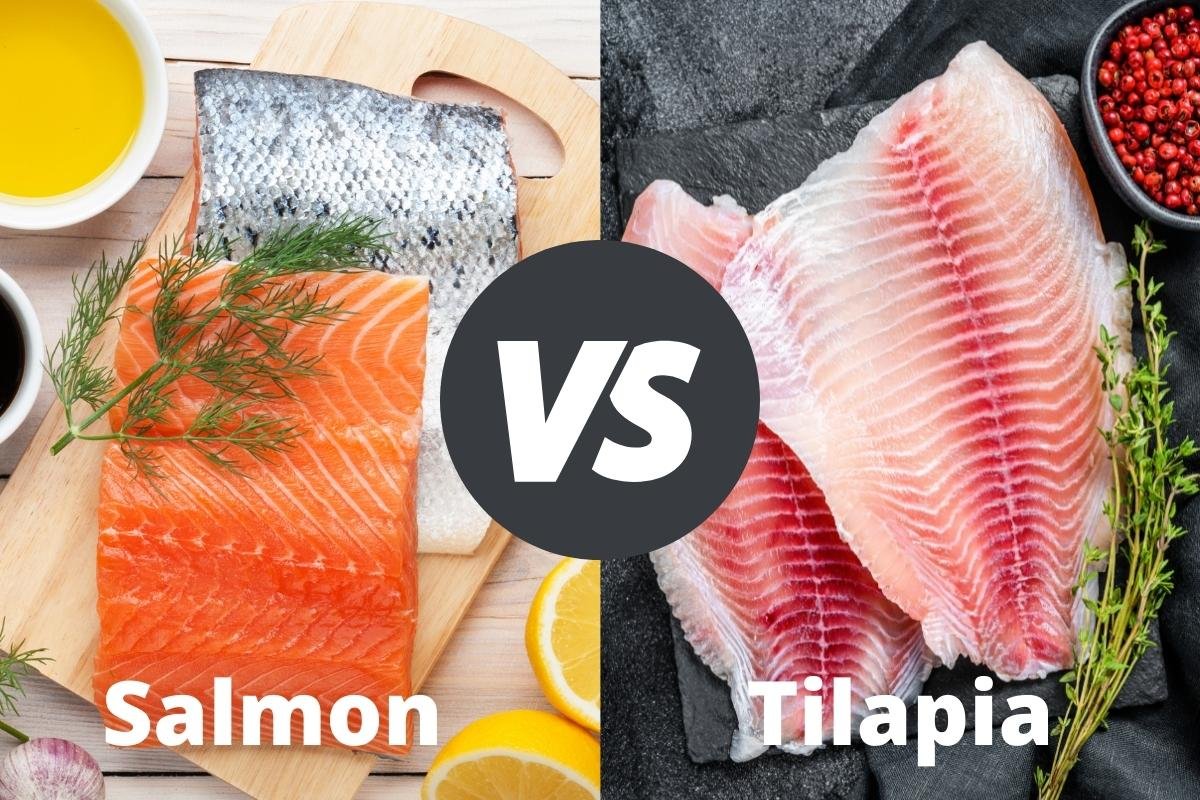Salmon and tilapia are two types of fish that are available at most supermarkets. There are important questions about the health benefits that may come from each selection, so we are going to look at both closely.
Both options offer important vitamins and minerals that could impact your health. But from a general perspective, which option is healthier? We will try to answer that question with a clear explanation in our comparison guide.
From a general health perspective, most people believe that salmon is a healthier choice for their diet than tilapia. This is true because tilapia is generally filled with Omega-6 fatty acids, which can ultimately lead to heart disease over long periods. Salmon offers Omega-3 fatty acids and tons of Vitamin B12.
While both options may be appropriate for your diet in moderation, it’s important to remember that you should always carefully consider the meal choices that you select. If certain types of vitamins or minerals are important for you, then you should carefully research your meal choice before actually eating it.
Salmon vs Tilapia | General Comparison
Salmon and tilapia can be delicious additions to your diet, especially if you enjoy eating seafood. There are impactful vitamins and minerals in each meal choice that can have an overall impact on your health.
In the next section, we’ll take a look at each of these health factors and try to identify which option may be best for your diet.
Omega-3 Fatty Acids & Omega-6 Fatty Acids
Salmon is known for offering a sufficient amount of Omega-3 fatty acids, while tilapia is known for offering Omega-6 fatty acids. It’s usually a pretty good idea to try and balance your intake of these types of fatty acids. However, this can be challenging since more people obtain far more Omega-6 fatty acids than Omega-3 fatty acids.
As long as you aren’t overeating tilapia or salmon, you shouldn’t really have to worry about how it integrates into your diet. This is true as long as you don’t have any other health risks like an increased chance of heart disease.
Understanding how to balance your intake of Omega fatty acids can have a positive impact on your overall diet and health.
Calories
It is estimated that salmon contains about 60% more calories than a similar portion of tilapia. Both are relatively low in overall calories. A standard portion of salmon is estimated to be around 300 calories while a similar portion of tilapia is just 180 calories.
This can be an important factor, especially if you are looking to reduce calories from your diet. Salmon has more calories than tilapia, which can mean that tilapia is better for a low-calorie diet.
There are some other negative effects from tilapia though. An increased intake of Omega-6 fatty acids can have a negative impact on long-term health.
Nutritional Value
Salmon and tilapia both provide certain levels of nutritional value. Tilapia and salmon offer reasonable amounts of protein and several key vitamins and minerals that can have positive or negative impacts on your health.
Salmon is known for its high level of Vitamin B-12, while tilapia has only about 50% of the amount that salmon does. Salmon also has a lot more fat, while tilapia has 60% fewer grams of fat.
If you’re looking for nutritional value, salmon has more overall nutritional value, but tilapia can also be an excellent choice if you’re looking for other dietary factors such as taking in fewer calories or less fat.
Comparison Chart | Salmon vs Tilapia
Here’s an in-depth comparison chart of some of the most important nutritional differences between salmon and tilapia. It’s important to understand these comparative factors, especially if you are struggling to figure out which option may be best for your diet.
| Salmon | Tilapia |
| Salmon is known for offering a high amount of Omega-3 fatty acids, which can be impactful on your diet. Source. | Tilapia has a much higher amount of Omega-6 fatty acids, which can be harmful if not moderated. |
| Salmon has a sufficient amount of Vitamin-B12, approximately twice as much as tilapia. | Tilapia only has around 50% of the Vitamin-B12 that can be obtained when eating salmon. |
| If you are looking to eat salmon in your low-calorie diet, it may be an okay choice but tilapia has fewer calories than salmon. | Tilapia is an excellent integration into either a low-calorie or low-fat diet. On the downside, it doesn’t offer a lot of Omega-3 fatty acids. |
| Salmon is generally considered to be a healthier choice than tilapia, but it really depends on your dietary goals. | Tilapia has some positive and negative impacts on your diet, so it’s important to conduct research before integrating it into your diet. |
This comparison chart helps evaluate several of the similarities and differences between salmon and tilapia. You should be able to make a well-informed nutritional decision after comparing and researching important nutritional facts about both types of seafood.
Want more food comparisons? See our articles for:
Related Questions
What is the healthiest fish to eat?
Salmon is considered by many to be the healthiest fish you can eat. This is because of the vitamins and calories that it offers as well as its versatility among health benefits.
Is tilapia a healthy fish to eat?
Yes, tilapia is healthy because, like salmon, it has a host of different vitamins that make it a great healthy choice over fatty foods. Most seafood has fewer calories and is packed with vitamins.



